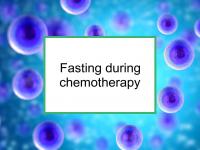Elevated blood sugar, insulin, insulin-like growth factor 1 (IGF-1) and inflammation levels are known risk factors for breast cancer and its recurrence. Fasting—no calorie intake at all—induces a dramatic reduction in glucose and IGF-I levels. Long-term calorie restriction has been shown to inhibit mammary tumor development in mice.
However, multiple periods of intermittent caloric restriction is even more effective in inhibiting mammary tumors, according to several studies. These findings from animal experiments suggest that fasting or calorie restriction could help breast cancer patients avoid some of the toxic side effects of chemotherapy while at the same time increasing its treatment effectiveness.
However, it has been demonstrated that rats deprived of protein experience increased doxorubicin-induced cardiomyopathy, heart damage that is among the most serious of doxorubicin's potential side effects. This troubling finding is a reminder that, while it makes sense for breast cancer patients to avoid overeating, there is not enough evidence at this point to recommend severe calorie restriction or outright fasting.
Latest research: Calorie restriction is less effective than starvation
The study referenced at the beginning of this news article was designed to evaluate calorie restricted diets with specified levels of carbohydrate, protein, and fat for their effects in mice on high-dose chemotherapy. Calorie restriction results in protection of normal cells and sensitization of cancer cells. These effects depend, in part, on reduced levels of IGF-1 and glucose. Short-term calorie restriction was found to significantly reduce glucose levels. However, only a complete lack of protein also reduced IGF-1 levels.
Short-term 50% calorie restriction combined with either a severe protein-deficiency or a ketogenic (high-fat, adequate-protein, low-carbohydrate diet designed to burn fats rather than carbohydrates) diet improved resistance to chemotoxicity similarly to the standard 50% calorie restriction. However, neither diet produced the high protection from the toxic effects of chemotherapy produced by short-term starvation. Of note was the finding that a high protein diet reversed the beneficial effects of short-term calorie restriction.
The authors also tested the diets in mouse models of glioma (a type of brain and central nervous system tumor) and breast cancer. The glioma was induced to grow under the skin. Feeding glioma-bearing mice a low protein diet (4% calories from protein) for over 20 days did not delay tumor progression once it was possible to manually detect the tumor (i.e., once it was large enough to be palpable). In addition, cycles of short-term (3 day) 50% calorie restriction did not enhance the efficacy of cisplatin chemotherapy in the mouse model of breast cancer.
The authors conclude that short-term calorie and/or macronutrient restriction does not provide the protection from chemotoxicity or the inhibition of progression of certain tumors achieved with fasting.
Please see our article on fasting during chemotherapy for more information.
